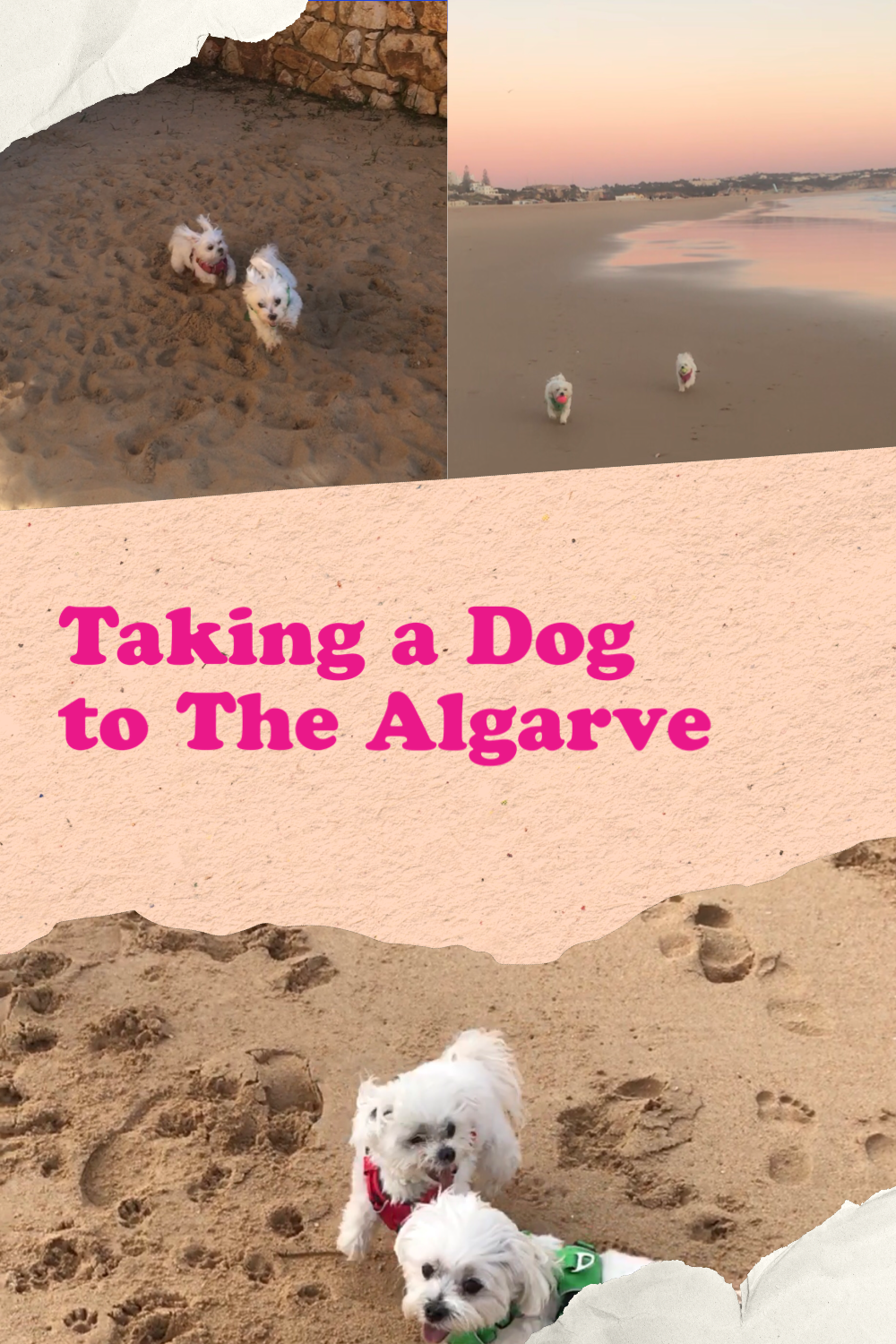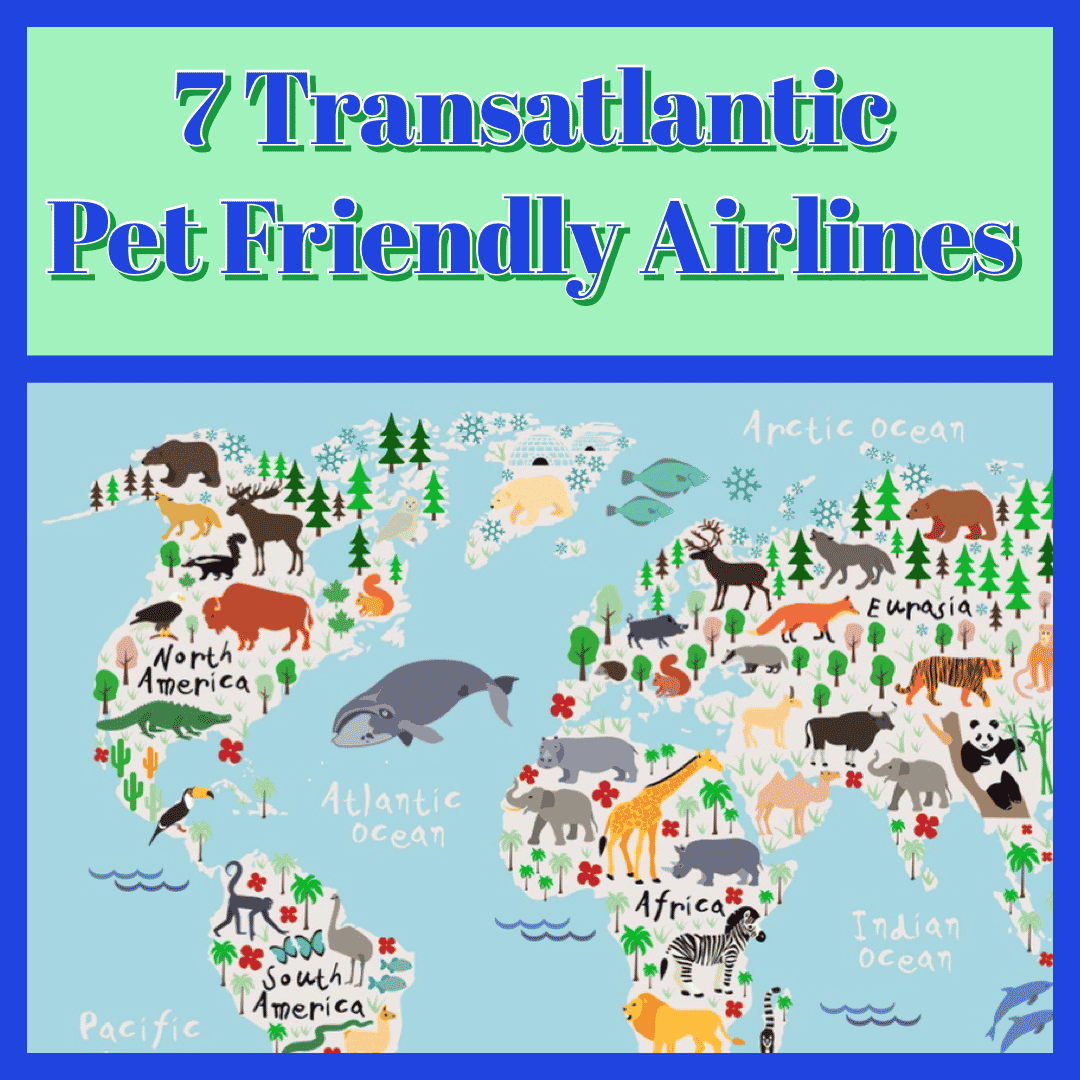If a new life in sun-soaked Portugal beckons for you and your cat or dog, welcome to the club! With countryside rambles, seaside swims and sandy toes (and paws) waiting for you, there’s plenty to be excited about. Holidaying in the sun with your dog is one thing, but if you’re relocating to Portugal permanently with your pet, there’s a few more tasks to complete. For example, by law, a dog license is required in Portugal, and there are restrictions on the number of pets permitted per household. Don’t worry, we’ll cover everything you need to do for taking your pet cat or dog to Portugal (including Madeira and the Azores), whether that’s for a holiday, or a permanent move. We’ve included pet laws for cats and dogs in Portugal, as well as access to public transport, beaches, and the requirement for dog licenses. And, of course, details of whether or not Portugal is dog friendly! Pet travel to Portugal is subject to the rules of the European Union Pet Travel Scheme (PETS), making travelling with a dog or cat to Portugal from another European Union (EU) country very simple. No need to panic if you reside in a non-EU region as the requirements for entering Portugal with a pet cat or dog are clearly stipulated for countries outside the EU too. To enter Portugal with a pet cat, dog or ferret, you’ll need either an EU issued Pet Passport or an Animal Health Certificate (AHC). Read on for our complete guide to taking a cat or dog to Portugal from countries including the USA, Canada, and Ireland, as well as the United Kingdom (Scotland, England, Northern Ireland and Wales).

Estimated reading time: 0 minutes
Table of contents
- Pet travel to Portugal from another EU country
- Pet travel to Portugal from a non-EU country
- Travelling to Portugal with more than 5 pets
- Taking a Pet to Portugal from the UK
- Pet Travel Options to Portugal from the UK & Ireland
- Travelling to Portugal with a Pet from the US & Canada
- Pets travelling without their owner
- Is Portugal Cat & Dog Friendly?
- Dogs in Public Areas in Portugal
- Roaming Rural Areas with your Dog
- Portugal Animal Welfare
- Owning a ‘Dangerous’ Dog Breed in Portugal
- Cat & Dog Limits per Household in Portugal
- Pet Microchip Portugal
- Finding a Lost Cat or Dog in Portugal
- Finding a Stray or Missing Cat or Dog in Portugal
- Renting a Property in Portugal with a Pet
- Dog Licenses
- Dogs on Trains in Portugal
- Protecting your Cat or Dog in Portugal
- Related Pages
Pet travel to Portugal from another EU country
In order to travel from another EU member state to Portugal, your cat, dog or ferret must have:
- A working Microchip (in line with the technical requirements of Annex II of the EU Regulation on the movement of pets)
or
A clearly readable tattoo if applied before 3 July 2011 - been vaccinated against Rabies
- a valid EU issued Pet Passport
Pet travel to Portugal from a non-EU country
With a few exceptions, your pet dog or cat can travel with you to Portugal from a non-EU country if they have:
- A working Microchip (in line with the technical requirements of Annex II of the EU Regulation on the movement of pets), or has a clearly readable tattoo if applied before 3 July 2011
- been vaccinated against Rabies
- Animal Health Certificate, or a Pet Passport that was issued by an EU member state
You can also use a Pet Passport issued in one of the following countries to travel to Portugal :
- Andorra
- Switzerland
- Faroe Islands
- Gibraltar
- Greenland
- Iceland
- Liechtenstein
- Monaco
- Norway
- San Marino
- Vatican City State
Travelling to Portugal with more than 5 pets
Under the rules of the EU Pet Travel Scheme (PETS), you can enter Portugal with up to five pets as long as each meets the stated requirements for travel. If you are travelling to Portugal with more than five pets (dogs, cats or ferrets) you must provide proof that:
- they are participating in a competition, exhibition or sporting event (by providing for example a registration document) and
- they are more than 6 months old
Should you have a few furry family members, be aware that cat and dog friendly airlines tend to have a one pet per passenger rule from the UK to Portugal. In this case, if you’re not driving, then Eurotunnel is your best bet with a taxi. You can take up to five pets in a vehicle on the Eurotunnel Le Shuttle service, so this tends to be a better choice than flying with multiple pets.
Another option is an animal courier service. If you select an animal courier to transport your pet by road from the UK or Ireland to Portugal, your cat or dog will travel separately from you.
Be aware that there are limits in Portugal for the number of pets allowed to live in each household.
Taking a Pet to Portugal from the UK
As the United Kingdom (UK) is no longer part of the European Union (EU) following Brexit, the regulations for taking a cat, dog or ferret from the UK (Scotland, England, Wales & Northern Ireland) to Portugal changed. This resulted in separate rules for the countries that form Great Britain (Scotland, England & Wales) and Northern Ireland (NI).
Pet travel regulations were differentiated between Scotland, England & Wales and the EU and Northern Ireland in order to avoid a ‘hard’ border post-Brexit between Northern Ireland and the Republic of Ireland.
Taking a pet to Portugal from Scotland, England or Wales
- You must have your dog, cat or ferret microchipped.
- Vaccinate your dog, cat or ferret against rabies – your pet must be at least 12 weeks old before they can be vaccinated.
- Wait 21 days after the primary vaccination before travel.
- Visit your vet to get an Animal Health Certificate (AHC) for your pet, no more than 10 days before travel to the EU.
- Remember that if you’re taking your dog to Portugal , on your return to the UK your pooch will need a Tapeworm Treatment 1 to 5 days before arriving on UK soil. Your vet must enter full details on the AHC following treatment.
Taking a Pet to Portugal from Northern Ireland (NI)
For the reasons previously mentioned, NI is subject to the same Pet Travel Scheme rules as other EU countries due to its shared border with the Republic of Ireland, an EU member state.
Pet Travel Options to Portugal from the UK & Ireland
If you’re still researching how to travel to Portugal with your pet, you may be deciding which method of transport is most suitable.
From the UK, or Ireland, there’s an assortment of viable pet travel options. You can select from:
From the US and Canada, it’s likely that you’ll have decided that flying your pet is best, as there’s no pet ferry (or tunnel!) from the US or Canada to continental Europe. However, rather than arranging flights yourself, you can appoint a pet courier to handle all aspects of the trip.
Pet Friendly Airlines UK & Ireland to Portugal
Tap Air Portugal is a pet-friendly airline from many worldwide locations, including the United Kingdom (UK) and Ireland.
Pet friendly flights with Tap Air Portugal, for cats and dogs in both the cabin and hold, are available from many UK cities. This includes Glasgow, Edinburgh, Manchester and London, as well as Dublin, Ireland.
For small cats and dogs in the passenger cabin, there are a few airlines that provide this service from the UK. The same airlines fly pets from Ireland too.
If your dog is too large to fly in the cabin, you might instead opt to take them in the hold as checked baggage or cargo.
Other airlines to check out to take your cat or dog to Portugal from the UK include:
These airlines don’t usually offer a direct route from the UK and Ireland to Portugal, but they’re a great option if Tap Air Portugal doesn’t have availability for your requirements. For example, with the above airlines, you can fly to Spain, France or Holland, and then onwards to Portugal with Transavia, Volotea or Vueling.
Sailing to Portugal with a Pet from the UK or Ireland
Unfortunately, there’s no pet ferry from the England or Ireland to Portugal. But, you can sail on a cat and dog friendly ferry to France or Spain, then drive onwards to Portugal. The Brittany Ferries pet friendly routes from England are very popular, and Stena Line offers pet friendly ferries from Ireland to France.
Taking a Pet to Portugal by Car
Eurotunnel Le Shuttle is another choice, provided that you have a car. Although you can hire a taxi, such as Folkestone Taxis, to carry you and your furry friends through The Tunnel.
If this all sounds too much, an accredited animal courier such as Animal Express or Euro Pet Transport might be the best choice for you. They take you pet door to door from the UK to Portugal.
Taking Multiple Pets to Portugal
Should you have a few furry family members, be aware that cat and dog friendly airlines tend to have a one pet per passenger rule from the UK to Portugal. In this case, if you’re not driving over to Portugal, then Eurotunnel is your best bet with a taxi. You can take up to five pets in a vehicle on the Eurotunnel Le Shuttle service, so this tends to be a better choice than flying with multiple pets.
Another option is an animal courier service, as mentioned above. If you select an animal courier to transport your pet by road from the UK or Ireland to Portugal, your cat or dog will travel separately from you.
Be aware that there are limits in Portugal for the number of pets allowed to live in each household.
Travelling to Portugal with a Pet from the US & Canada
In order to take your pet to Portugal from North America, in addition to Tap Air Portugal, cat and dog friendly airlines from Canada and the US include:
Should you decide to use the services of an animal courier, you can select from the International Pet & Animal Transport Association (IPATA) approved companies, or try Portugal Pet Relocation.
Pets travelling without their owner
As a rule, pets must travel with their owners to Portugal ; however, you may give written permission to another person to accompany your cat, dog or ferret for you. In this case, you must be reunited your pet within 5 days of their relocation.
Relocating to Portugal with your Cat or Dog
If you’re moving to Portugal permanently with your pet, then there’s a few extra things you must do. This includes an annual Dog License, as well as adhering to the number of pets permitted in each home. The following sections cover moving to Portugal with cats and dogs, but some areas may be of interest if you’re going on an extended holiday with your pet. For example, we’ll cover whether Portugal is dog friendly, and if you can access public transport, beaches and restaurants.
Is Portugal Cat & Dog Friendly?
When deciphering whether or not to relocate to Portugal with your cat or dog, no doubt one of your first questions, as an animal lover, is if it’s cat and dog friendly. Even if you’re heading to Portugal on holiday, you’ll want to know if Portugal is deemed a dog friendly country.
You may also be aware that the answer to this question isn’t always simple, since it depends on intent. For example, the question could be related to allowing dogs in restaurants, beaches and bars in Portugal. Or it can be a more detailed enquiry about the status of animal welfare in Portugal. We’re going to cover both aspects of life in Portugal with animals.
Dogs in Cafes & Restaurants
In terms of dog-friendliness, and given the almost year-round sunshine, dogs can sit with you in the terraces of bars and restaurants. Under Decree Law 15/2018, with the agreement of the establishment owner, your pet can enter an indoor area in Portugal. If dogs are allowed indoor access, there’s likely to be a sign outside indicating that dogs are welcome. Your dog will have to be on a leash at all times, and be tethered close to you, or they can be inside a travel carrier if they’re small enough!
However, this is completely at the discretion of the owner, and many restaurants in Portugal don’t permit dogs inside. Of course, identifiable Assistance & Service Dogs will always be allowed inside business premises.
Pet Laws & Regulations in Portugal
The above Decree Law also enforced the responsibilities associated with pet ownership in Portugal, with the aim of reducing animal abandonment. All pet owners in Portugal must meet their pet’s health and welfare needs, including access to water, food, vaccinations, veterinary care and identification.
Should you be holidaying in Portugal with your cat or dog, they will, of course, have met the mandatory entry requirements under the EU Pet Travel Scheme. But, if you’re moving to Portugal permanently, you must ensure that your cat, dog or other animal meets the laws in force.
Owners of cats and dogs in Portugal must report the death or disappearance of their pet to their local parish council. Otherwise, the pet will be deemed as abandoned and fines will be imposed.
Dogs in Public Areas in Portugal
If you’re taking a dog to Portugal, it’s important to know that while walking your dog on public roads, and in open spaces, they must be on a leash under Portuguese Law. Dogs may only be in public areas with their owner. But, many people allow their dogs to roam freely, so if you see a healthy looking dog wearing a collar on its own, quite often they’re not a stray and have an owner!
Dog breeds classed as ‘dangerous’ must also be muzzled at all times and be accompanied by someone over 16 years of age. They must also remain on a leash of 1m or under.
Are Dogs allowed on Beaches in Portugal?
You’ll be pleased to know that outside of the peak summer season in Portugal, dogs are allowed on the majority of beaches. From around Easter to the end of October, there’s normally a sign on popular beaches showing that dogs aren’t permitted. This tends to be in line with when the lifeguards start working, and the concessional sunbeds are laid out.

However, once the signs are removed on Portuguese beaches around October, you’re free to take your dog for a sandy stroll and swim!
In our opinion, if you’re taking a dog to Portugal, the best beach in the Algarve during the winter months is Praia Da Rocha. With around 2 miles of endless, golden sand, it’s a doggy paradise! Our dogs have enjoyed many a day there, and as the Algarve is pretty tranquil during the winter months, it’s perfect.

Praia de Falésia in Albufeira is also recommended for a winter stroll. On a few occasions we’ve had the whole place to ourselves with Django, Arya and Summer.
When you take your dog to Portugal, you’ll no doubt get chatting with other pet owners. And, we bet you’ll hear that it’s fine to walk your dog on busy beaches during the summer, provided that you do so before 9am and after 7pm. Be aware that this isn’t a rule, but it is something that tends to be allowed, as the beaches are quiet during these hours. However, you could still be fined by the police.
Year Round Dog Friendly Beaches in Portugal
You can take your dog to year round dog friendly beaches in Portugal, so you don’t have to avidly wait for the ‘no dog’ signs to be removed! These include:
- Boca do Rio, Vale de Bispo, Budens, Algarve (unofficial dog friendly beach)
- Coral Beach, Viana do Castelo
- Porto do Areia Norte Beach, Peniche
- Praia Suave Mar, Esposende
- Ramalha Sul Beach, Esposende
By law, dogs are required to be muzzled and on a lead, but on registered dog friendly beaches, most owners let their dogs run free. In fact, about 80% of dogs on any beach are usually off lead. This tends to be acceptable, provided that your four-legged friend is well behaved.
However, if your furry companion is on the ‘dangerous’ dogs list in Portugal, they must remain muzzled and on a lead of 1m or less at all times.
Roaming Rural Areas with your Dog
Be aware that during hunting season in Portugal, hunters are likely to be around if you’re wandering in woodland areas with your dog. While it might spoil their fun, it’s best to keep your dog on a lead for the following reasons:
- A hunter may just see a moving animal, and take fire
- While traps are illegal, some people still use them
- Poison is sometime
Portugal Animal Welfare
In 2017, new laws were introduced that recognise domestic animals as living, sentient beings. Decree Law 8/2017 marked the growing, cultural shift in Portuguese pet owners, and aims to ensure that animals are protected. Laws in Portugal are moving towards being more cat and dog friendly, as well as other domestic animals. This include the requirement for cats and dogs to be microchipped, and wear a collar at all times.
Animal abandonment in Portugal is still an issue, but over the coming years, there’s hope that the law will gradually change the mindset of any pet owners who do not properly care for their animal companions.
If you’re relocating to Portugal with a cat or dog, be prepared that you might end up with some new furry family members! We arrived here five years ago with just Django and Arya. We now have Summer, a two year old pooch rescued from a neighbour, as well as two cats, Star and Storm, that were on the streets as kittens.

Owning a ‘Dangerous’ Dog Breed in Portugal
Dogs classed as potentially dangerous must adhere to additional laws in Portugal. The regulations are in place as the following dogs have the necessary strength and anatomy to cause serious harm to other beings:
- American Staffordshire Terrier
- Brazilian Fila Dog
- Great Dane
- Inu Grooming
- Pit Bull
- Rottweiler
- Staffordshire bull terrier
- Inu Grooming
So, if you’re taking one of these dog breeds to Portugal, you must be aware of the special rules. Owners of these breeds must register their dog at the local freguesia (parish council) with breed details. In public places, your dog must also be muzzled, on a leash of 1m or under, and be accompanied by someone aged over 16 years.
In addition, following the Portuguese Decree Law introduced in 2015, which has only been rolled out recently, owners of potentially dangerous dogs must undergo training. The training courses are led by the Public Security Police (PSP) and National Republican Guard (GNR). You will be advised of the next available training course when you register your dog at the parish council.
Cat & Dog Limits per Household in Portugal
In both urban houses, and apartment buildings, there’s a limit on the number of cats and dogs per household. At present, by law in Portugal, up to three dogs, or four cats, not exceeding four animals in total, may reside in the same home. This can be increased to six pets upon agreement with your local city council. So, if you’re relocating to Portugal with your cats and dogs, it’s important to be aware of these limitations.
Pet Microchip Portugal
All cats, dogs and ferrets must have a microchip to reside in Portugal in accordance with the law. Following Decree-Law No. 82/19, the Information System for Pets (SIAC) was introduced, with the aim of “preventing abandonment and its consequences for the health and safety of people and animal welfare”.
Therefore, all pets living in Portugal for more than 120 days, must be registered on the SIAC by your veterinarian. As your cat, dog or ferret will already have required a microchip to relocate to Portugal, you will only need to take them to the local vet for the microchip to be registered on the SIAC.
In fact, this is a really important first step when you take your pet to Portugal permanently. For example, if your cat or dog gets lost, the microchip needs to show your Portuguese address and contact number so that you can be reunited. If you don’t update the microchip address, it will still have your old contact details.
So, as well as ensuring you comply with cat and dog laws in Portugal, it’s vital you update the microchip address for pet safety purposes.
Finding a Lost Cat or Dog in Portugal
If your cat or dog runs off in Portugal, check out the Facebook groups for found and missing pets in your local area. For instance, in the Algarve region, there’s Missing Pets Algarve and Found Pets Algarve. They have an excellent success rate in reuniting lost pets with owners, and due to the number of members, you’ll have lots of extra eyes on the lookout for your little runaway!
Be sure to do the following as soon as possible after your cat or dog goes missing:
- Go to the encontra-me (find me) website and add your missing pet’s details.
- Put up posters locally, and give copies to any vets in the area, as well as the local council kennel (canil municipal). Be sure to include clear photos of your pet, as well as your contact information.
- Post on the appropriate missing pets Facebook group, and keep an eye on any local pages for found pets
- If your dog is lost, let the police (GNR) know.
- Leave food, water and an old item of your clothing in the location your pet went missing.
Like many countries, there are certain groups or gangs that steal dogs from gardens, particularly small lapdog breeds or hunting dogs. Regardless of your dog’s breed, be vigilant and don’t leave them outside if you aren’t home.
Finding a Stray or Missing Cat or Dog in Portugal
You may arrive in Portugal from a country that doesn’t have a stray animal issue. Wherever you live in Portugal, the likelihood is that you’ll come across a stray or missing cat or dog at some point.
Firstly, if the animal looks sick or malnourished, please take them to a vet immediately. If you aren’t in a position to pay, there are many charities in Portugal who’ll cover any associated costs – check out Facebook groups for a local organisation.
In any case, the cat or dog should be microchipped so it’s vital to get them scanned by a vet or someone from a local charity. But, despite the law, many pets still aren’t microchipped in Portugal. And, sometimes, owners allow their dogs to roam the streets on their own, therefore if a dog has a collar and looks healthy, it’s likely they’re just out for a wander. But, ask around locally to be sure, or post on a local Facebook group.
Be sure to post photos of the cat or dog on a found pets Facebook group for the relevant region, and include details of the general location.
Renting a Property in Portugal with a Pet
Technically, by law, landlords can’t refuse a property in Portugal to you because you have a cat or dog. However, in reality, a landlord has free will to choose the person they want as their tenant!
In general, when relocating to Portugal, with or without a cat or dog, renting a property long term in certain areas can be problematic. Prices tend to be high, and there’s a consistently increasing demand for a long term (1 year +) rentals.
Many landlords in the Algarve prefer to rent their property to tourists during the summer months. But, there’s still enough pet-friendly properties to choose from if you look in the right places. As well as local estate agents, keep an eye on:
- sapo.pt
- olx.pt
- custojusto.pt
- idealista.pt
- longtermlettings.com
- Facebook groups for long term rentals in Portugal
If you own one of the dog breeds listed above as ’potentially dangerous’, you’ll have to advise potential landlords.
Dog Licenses
By law, permanent residents in Portugal must hold a license for their dog. This can be obtained from your local freguesia, a council building similar to a town hall. Your dog must be microchipped and vaccinated against rabies, which will have been done in order for them to travel to Portugal.
A dog license in Portugal costs about €7, and must be renewed annually.
Dogs on Trains in Portugal
In Portugal, you can take your dog on a train, they’re even allowed in First Class! We opted for a train with Django and Arya from the Algarve to Porto, and it was a breeze.
To travel on a Portuguese train (Comboios de Portugal) with your dog, they must:
- Be clean and hygienic
- Wear a leash and muzzle, or be in a travel carrier
- Not disrupt other passengers
Cats can also travel on Portuguese train services in a cat carrier.
Both cats and dogs are also allowed on buses in Portugal, as long as they meet the above criteria. So, public transport in Portugal is pet friendly!
However, dog breeds classed as ‘potentially dangerous’ can’t use public transport in Portugal.
Cost of Taking a Pet on Portuguese Public Transport
Sud Expresso / Lusitânia Comboio Hotel
The carriage of pets weighing up to 10 kg, is only allowed in the sleeping cars when the compartment is sold to a single family. Your pet must be carried as hand luggage in a proper carrier no larger than 60 x 35 x 35 cm. No more than two cats and dogs are allowed per compartment. The price is €30,50.
Lisbon, Oporto and Coimbra urban trains / Alfa Pendular / Intercidades / InterRegional / Regional
Your pet travels for free, as long as they travel in a suitable pet carrier that can be taken as hand luggage. Only one travel carrier is permitted per passenger.
Celta
Passengers can take one pet weighing up to 10kg if in a proper travel kennel no larger than 60 x 35 x 35 cm that can be taken as hand luggage. Your cat or dog will travel for free.
Dogs can be taken without being in a transporter box if the owner buys a ticket for them depending non the train, as shown below:
- Alfa Pendular and Intercidades: full-price ticket (only on sale from ticket offices);
- Regional and InterRegional: half-price ticket (only on sale from ticket offices).
On the Lisbon, Porto and Coimbra urban trains the dogs travel for free.
In these circumstances, your dog has to have a muzzle and be on a short leash. You must also carry their Vaccination Record and Dog Licence.
So as not to bother other passengers, your dog must remain on the floor for the duration of the train journey.
Guide Dogs travel for free on all services, but you still need to show their Vaccination Card and Dog License.
Pet Car Safety Laws in Portugal
According to Portuguese Decree-Law 315/2003,
the transport of animals must be carried out in vehicles and containers appropriate to the species and number of animals to be transported, taking into account the space, ventilation, temperature, safety and supply of water in order to safeguard their protection and the safety of people and other animals.
If this law isn’t complied with and if, when traveling with pets , your driving is put at risk, as well as the safety of passengers or even your pet, know that you could be fined. The fines range between €60 and €600.
Protecting your Cat or Dog in Portugal
Last, but very much not least, if you’re taking your beloved cat or dog to Portugal from the UK, USA or Canada it’s so important that you swat up on the regular medication that they’ll need.
Due to the climate in Portugal, pets are at risk of some very nasty vector-borne diseases from mosquitoes and sandflies. So be sure to read the following pages, then discuss with your vet which methods of protection are best for your cat or dog:
Happy travels, we’re sure you’ll have lots of amazing pet adventures in Portugal!








